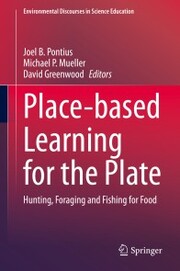Detailansicht
Place-based Learning for the Plate
eBook - Hunting, Foraging and Fishing for Food, Environmental Discourses in Science Education
ISBN/EAN: 9783030428143
Umbreit-Nr.: 9478120
Sprache:
Englisch
Umfang: 0 S., 11.38 MB
Format in cm:
Einband:
Keine Angabe
Erschienen am 08.06.2020
Auflage: 1/2020
E-Book
Format: PDF
DRM: Digitales Wasserzeichen
- Zusatztext
- <div><div>This edited volume explores 21st century stories of hunting, foraging, and fishing for food as unique forms of place-based learning. Through the authors narratives, it reveals complex social and ecological relationships while readers sample the flavors of foraging in Portland, Oregon; feel some of what its like to grow up hunting and gathering as a person of Oglala Lakota and Shoshone-Bannock descent; track the immersive process of learning to communicate with rocky mountain elk; encounter a road-killed deer as a spontaneous source of local meat, and more.</div><div><br></div><div>Other topics in the collection connect place, food, and learning to issues of identity, activism, spirituality, food movements, conservation, traditional and elder knowledge, and the ethics related to eating the more-than-human world. This volume will bring lively discussion to courses on place-based learning, food studies, environmental education, outdoor recreation, experiential education, holistic learning, human dimensions of natural resource management, sustainability, food systems, environmental ethics, and others.&nbsp;</div></div>
- Kurztext
- This edited volume explores 21st century stories of hunting, foraging, and fishing for food as unique forms of place-based learning. Through the authors' narratives, it reveals complex social and ecological relationships while readers sample the flavors of foraging in Portland, Oregon; feel some of what it's like to grow up hunting and gathering as a person of Oglala Lakota and Shoshone-Bannock descent; track the immersive process of learning to communicate with rocky mountain elk; encounter a road-killed deer as a spontaneous source of local meat, and more.Other topics in the collection connect place, food, and learning to issues of identity, activism, spirituality, food movements, conservation, traditional and elder knowledge, and the ethics related to eating the more-than-human world. This volume will bring lively discussion to courses on place-based learning, food studies, environmental education, outdoor recreation, experiential education, holistic learning, human dimensions of natural resource management, sustainability, food systems, environmental ethics, and others.&nbsp;
- Autorenportrait
- <div>Joel Pontius, PhD, is a sustainability and environmental education professor at Goshen Colleges Merry Lea Environmental Learning Center where he directs the Sustainability Leadership Semester. His writing, teaching, and advocacy are informed by practices of foraging, gleaning, hunting, and fishing for food.</div><div><br></div><div>Michael Mueller, PhD, is a professor of secondary education with expertise in environmental and science education in the College of Education at University of Alaska, Anchorage. His philosophy focuses on how privileged cultural thinking frames our relationships with others, including nonhuman species and physical environments. He is the co-Editor-in-Chief of Cultural Studies of Science Education.</div><div><br></div><div>David Greenwood, PhD, is Professor and Canada Research Chair of Environmental Education at Lakehead University in Thunder Bay, Ontario, Canada. His scholarship, teaching, and activism revolve around place-based, environmental, sustainability, and holistic education. </div><div><br></div>
